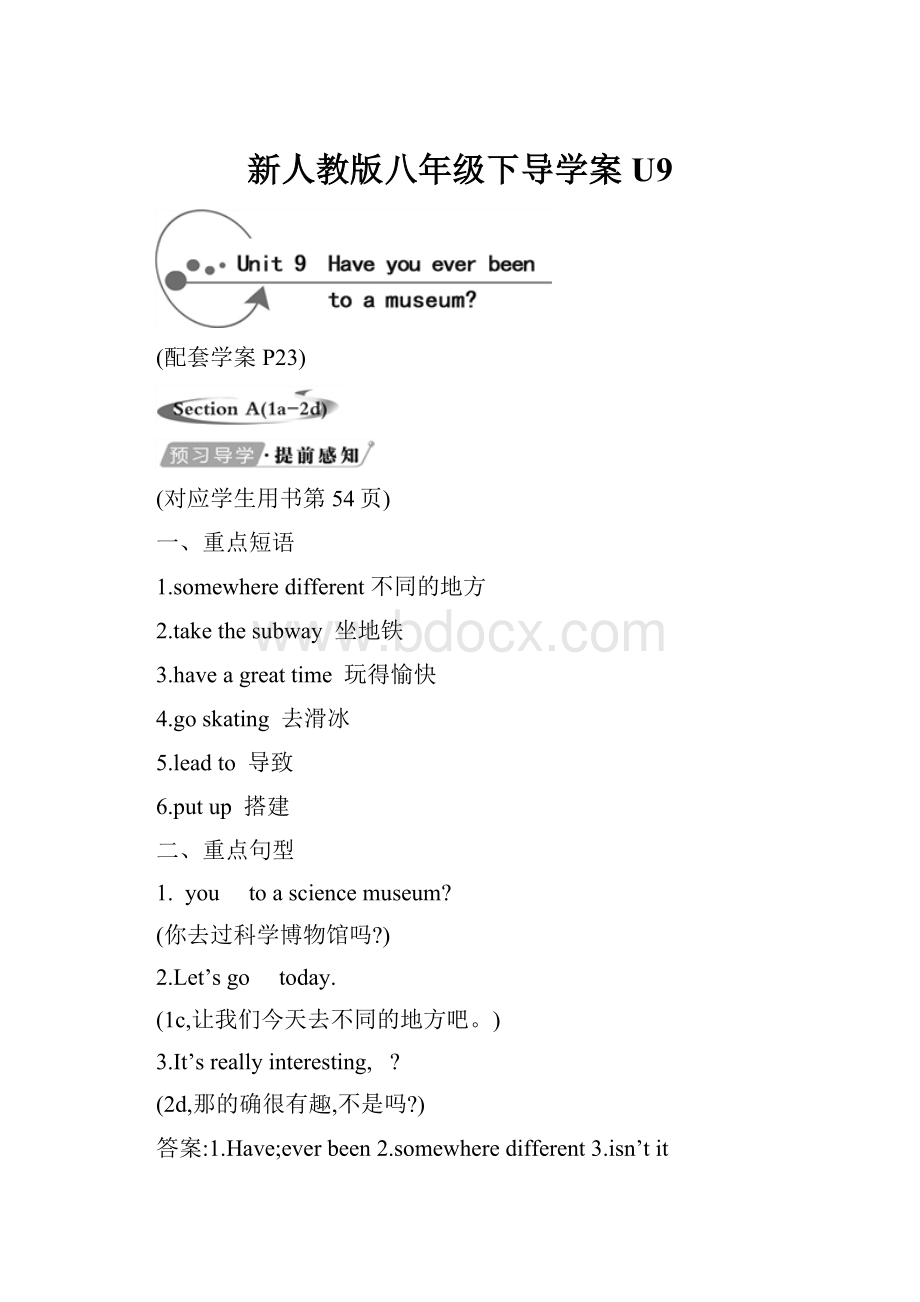新人教版八年级下导学案U9.docx
《新人教版八年级下导学案U9.docx》由会员分享,可在线阅读,更多相关《新人教版八年级下导学案U9.docx(30页珍藏版)》请在冰豆网上搜索。

新人教版八年级下导学案U9
(配套学案P23)
(对应学生用书第54页)
一、重点短语
1.somewheredifferent不同的地方
2.takethesubway坐地铁
3.haveagreattime玩得愉快
4.goskating去滑冰
5.leadto导致
6.putup搭建
二、重点句型
1.youtoasciencemuseum?
(你去过科学博物馆吗?
)
2.Let’sgotoday.
(1c,让我们今天去不同的地方吧。
)
3.It’sreallyinteresting,?
(2d,那的确很有趣,不是吗?
)
答案:
1.Have;everbeen2.somewheredifferent3.isn’tit
(对应学生用书第54页)
探究一辨析have/hasbeento与have/hasgoneto
Haveyoueverbeentoasciencemuseum?
你去过科学博物馆吗?
(P65)
备选例句:
1.Mr.Wangisn’there.HehasgonetoQingdao.
王先生不在这里。
他去青岛了。
2.MyfatherhasbeentoBeijingtwice.
我父亲去过北京两次。
have/hasbeento和have/hasgoneto的区别:
1.have/hasgoneto意为“到某地去”,说话时该人不在现场,一般不用第一人称、第二人称代词作句子的主语。
2.have/hasbeento意为“曾经去过某地”,现在已不在那里了,后可接次数,如once,twice,threetimes等,表示“去过某地(几次)”,也可和just,never,ever等连用。
【即学即练】
1.——吉姆在哪里?
——他去英国了。
—WhereisJim?
—HeEngland.
2.我从未去过长城。
InevertheGreatWall.
3.NeitherKatenorhercousinstoAmerica,butofthemhaveknownthecountryverywell.(2013绥化)
A.havebeen;all
B.havegone;both
C.hasbeen;all
答案:
1.hasgoneto2.have;beento3.A
探究二neither的用法
—Haveyoueverbeentoahistorymuseum?
—No,Ihaven’t.
—Meneither.
——你去过历史博物馆吗?
——不,我没去过。
——我也没去过。
(P65)
备选例句:
1.—Idon’tlikethisdress.
—Neither/NordoI.
——我不喜欢这件连衣裙。
——我也不喜欢。
2.Iwilltakepartinneithergame.
那两项比赛我都不参加。
3.—Whichonewouldyoulike?
—Neither.
——你喜欢哪一个?
——两个都不喜欢。
4.NeitherhenorIamwelleducated.
他和我都没受过良好教育。
neither的用法:
1.neither用作副词,作“也不”解释,放在句首,表示前面否定的内容也适用于另一个人或物,句子须采用部分倒装。
Meneither.是省略句。
2.neither用作形容词,表示“(两者)都不”,置于单数名词之前。
3.neither用作代词,表示“两者都不,双方均不”。
4.neither用作连词,常用短语为neither...nor...,表示“既不……也不……”。
neither...nor...结构用作主语时,谓语动词必须与nor后面的名词或代词在人称及数上保持一致,即所谓的就近原则。
【即学即练】
1.——我不吸烟。
—Idon’tsmoke.
——我也不吸烟。
—.
2.她买了两个玩具,却没有一个能让小孩高兴。
Sheboughttwotoys,butcanpleasethechild.
3.—I’dlikeyoutotellmesomethingaboutShenNongjia.
—I’msorry,butneitherJacknorIthere.(2013孝感)
A.havebeenB.hasbeen
C.havegoneD.hasgone
答案:
1.Meneither2.neither3.A
探究三反意疑问句
It’sreallyinteresting,isn’tit?
那的确很有趣,不是吗?
(P66)
备选例句:
1.Itlookslikerain,doesn’tit?
看起来要下雨了,不是吗?
2.Hedoesn’tneedtoworksolate,doeshe?
他不需要工作得太晚,对吗?
3.Theyhavetostudyalot,don’tthey?
他们必须学很多,不是吗?
总结反意疑问句的用法:
反意疑问句又叫附加疑问句,是在陈述句后,对陈述句所叙述的事实提出的疑问。
其基本结构有两种:
一是“肯定陈述句+简略否定问句”;二是“否定陈述句+简略肯定问句”。
反意疑问句后一部分的主谓与前一部分的主谓要保持人称及助动词等方面的一致。
这种疑问句的回答要根据事实,一般情况下,肯定的用“Yes,”否定的用“No,”。
注:
当陈述句中出现never、no、none、few、hardly、seldom等表示否定的词时,附加的问句应用肯定形式。
【即学即练】
1.Lindaatesomericethismorning,?
A.didn’tsheB.wasshe
C.didsheD.wasn’tshe
2.Theyhavenotimetovisitthemuseum,?
A.dotheyB.haven’tthey
C.don’ttheyD.willthey
3.Therewon’tbeanyconcertthisSaturdayevening,?
A.willtherenotB.willthere
C.isthereD.won’tthere
4.Shehasneverbeentothecity,she?
(2013遂宁)
A.doesn’tB.hasn’tC.has
答案:
1.A2.A3.B4.C
(对应学生用书第55页)
根据所给汉语意思完成句子,每空一词。
1.——你曾经去过太空博物馆吗?
——不,我没去过。
—youeverthespacemuseum?
—No,I.
2.让我们今天去不同的地方吧。
Let’sgotoday.
3.同学们和老师都不打算去远足。
studentstheteachergoingtogohiking.
4.那的确很有趣,不是吗?
It’sreallyinteresting,?
答案:
1.Have;beento;haven’t2.somewheredifferent3.Neither;nor;is4.isn’tit
(对应学生用书第101页)
【基础达标】
Ⅰ.单项选择
1.Jimlikestraveling.Hemanyplaces.
A.hasgonetoB.hasbeento
C.hasgoneforD.hasbeenfrom
2.—AreTomandMaryplayingoutside?
—.Theyaredoingtheirhomework.
A.BothB.Neither
C.EitherD.None
3.Myfatherisn’there.Hetotheairporttomeetmyuncle.
A.goB.hasbeen
C.hasgoneD.wouldgo
4.Wearefreetoday.Let’sgo.
A.somewheredifferent
B.differentsomewhere
C.anywheredifferent
D.differentanywhere
5.ThegovernmenthasmanybuildingsforthepeopleinWenchuanaftertheearthquake.
A.putdownB.putup
C.putoffD.puton
答案:
1.B2.B3.C4.A5.B
Ⅱ.根据汉语提示写单词
6.Ihaveneverbeentoan(娱乐)park.
7.—Whatdoyouthinkoftheartmuseum?
—It’s(太棒了).
8.—Howdidyougotothespacemuseum?
—Itookthe(地铁).
9.Thespinningwheel(纺车)wasaChinese(发明).
10.I(野营)inthemountainswithmyparentslastweek.
答案:
6.amusement7.fantastic8.subway9.invention10.camped
Ⅲ.用所给词的适当形式填空
11.—you(have)yourlunchyet?
—Yes,Ihave.
12.Lucy(be)tothewaterparktwice.
13.Neitherofthem(be)fromBeijing.
14.They(go)tothewaterworldwiththeirfriendslastmonth.
15.—WhereisSarah?
—She(go)toNewYork.Andshe’llbebackintwoweeks.
答案:
11.Have;had12.hasbeen13.is14.went
15.hasgone
Ⅳ.完成句子
16.他们两个都不说汉语。
themspeaksChinese.
17.如果他不去,我也不去。
Ifhedoesn’tgo,I.
18.今天的天气很好,不是吗?
It’saniceday,?
19.——你曾经去过四川吗?
——不,没去过。
—youeverSichuan?
—,I.
20.我们在水上公园玩得很愉快。
Weatthewaterpark.
答案:
16.Neitherof17.neitherdo18.isn’tit19.Have;beento;No;haven’t20.hadagreattime
【能力提升】
Ⅴ.阅读短文,根据短文内容回答下列各题
Campinginyourbackyardisfulloffun,whateveryourageis.It’sgreatforkeepingusrelaxed.Itofferschancestocheckthenightskyandtobenoisierthanusual.Itletsushavefriendsovertostaywhomightnotfitinsidethehouse!
Followtheseinstructionsandyou’llhaveanightyou’llneverforget!
Putupyourtent.
Dependingonthenumberoffamilymembersandguests,youmayneedmorethanonetent.Tellyourfriendstobringtheirtentsifneeded.FollowtheinstructionsorcheckoutthearticlesonhowtoputupatentontheInternet.
Prepareyourbedding.
You’llwantyourgueststobeabletorelaxincomfort.Putsomethingsofttolieononthefloor:
Ablow-upairmattressorthickcomfortersmayworkwell.Fillthetentwithsofttoysandblankets(毯子).Havelightweightsleepingbagsorcottonblankets.Theyareespeciallyimportantifyoulivewherethenighttemperaturesdropgreatly.
Prepareaseatingarea.
Ifyouhaveapicnictable,thatwouldworkbest.Ifnot,setupafewchairsandasmalltabletosetoutdrinksandfood.Asimplechoiceistolayoutablanketinthesun,sothatyourfriendscaneatandtalk.Besurethegrassisn’twet!
Makememories.
Plansomeactivities.You’recampinginthebackyard,soit’stimetomakethemostofbeingoutdoors.
Haveacameranearbytotakesillyphotosofyou,yourfamilymembers,andyourfriends.Takeonelargegroupshotwitheveryonesmilingandlaughing.Besuretomakecopiesforeveryone!
21.Iscampinginthebackyardgreatfun?
22.Whatcanwedotohelprelaxourguestsincomfort?
23.Whatisasimplechoicetoprepareaseatingarea?
24.Howdowemakememories?
25.Whatisthepassagemainlyabout?
答案:
21.Yes.
22.Putsomethingsofttolieononthefloor.
23.Asimplechoiceistolayoutablanketinthesun.
24.Bytakingphotosofus,ourfamilymembersandfriends.
25.Howfunthecampingisandhowwehavegreatcamping.
(对应学生用书第55页)
一、重点短语
1.insucharapidway以如此快速的方式
2.somany如此多的
3.differentkindsof不同种类的
4.asenjoyableas和……一样快乐
5.hearof听说
6.arriveat到达
二、重点句型
1.ThemuseumI’veeverbeentoistheAmericanComputerMuseum.
(3a,我去过的最有趣的博物馆是美国的计算机博物馆。
)
2.It’sthattechnologyhasprogressedarapidway!
(3a,科学技术以如此快的方式发展,真是难以置信!
)
3.Italsogovernmentsandsocialgroupswaystoimprovetoiletsinthefuture.
(3a,那也可以鼓励政府和社会团体去设法改造未来的厕所。
)
答案:
1.mostinteresting2.unbelievable;insuch3.encourages;tothinkabout
(对应学生用书第56页)
探究一辨析such与so
It’sunbelievablethattechnologyhasprogressedinsucharapidway.
科学技术以如此快的方式发展,真是难以置信。
(P67)
备选例句:
1.Hegaveussuchgoodfood.
他给了我们这么好的食物。
2.Heissofoolish(aman).
他是如此愚蠢(的一个人)。
3.Therearesomanyflowersinourschoolgarden.
我们学校的花园里有那么多的花。
such和so的区别:
1.such是形容词,用来修饰名词,名词前有无形容词都可以;so是副词,用来修饰形容词或副词,形容词后可以省略名词。
2.单数名词前有不定冠词与形容词时,so和such的位置不同。
前者为“so+形容词+冠词+名词”,后者为“such+冠词+形容词+名词”。
3.so后即使有形容词,也不能修饰复数名词或不可数名词,而such则可以。
4.名词前有表示“多、少”意义的many,much,few,little等修饰词时,要用so,不用such。
【即学即练】
1.我以前从没见过这么小的绵羊。
Ihaveneverseenlittlesheepbefore.
2.它们是如此有用的书。
Theyareusefulbooks.
3.“I’masinger”isaninterestingTVshowmanypeoplelikewatchingit.(2013泰州)
A.so;thatB.such;that
C.so;asD.such;as
答案:
1.such2.such3.B
探究二encourage的用法
Italsoencouragesgovernmentsandsocialgroupstothinkaboutwaystoimprovetoiletsinthefuture.
那也可以鼓励政府和社会团体去设法改造未来的厕所。
(P67)
备选例句:
Iencouragedhertoworkhardandtotryfortheexamination.
我鼓励她用功并为这次考试做努力。
encourage的用法:
encouragev.意为“鼓励,鼓舞;支持;促进;鼓动”。
encouragesb.todosth.鼓励某人做某事。
【即学即练】
1.事情进展不顺的时候,他鼓励我说不要放弃。
Whenthingsaren’tgoingwell,heencouragesme.
2.你妈妈是怎样鼓励你努力学习的?
Howdidyourmotheryouhard?
答案:
1.nottogiveup2.encourage;tostudy
探究三辨析hearof,hearfrom与hear
HaveyoueverheardofaDisneyCruise?
你听说过迪斯尼游轮吗?
(P68)
备选例句:
1.Ihaveneverheardofthisplace.
我从未听说过这个地方。
2.Haveyouheardfromyourpenpal?
你是否收到过笔友的来信?
3.Iheardhimsinginginthenextroom.
我听见他在隔壁房间里唱歌。
hearof,hearfrom和hear的区别。
1.hearof“听说,得知”,后面接名词或代词。
2.hearfrom“收到……来信”,后面常接人作宾语。
3.hearv.“听见,听到”。
常用于hearsb./sth.do/doingsth.听见某人/某物(正在)做某事。
【即学即练】
1.你听说过长城吧?
youevertheGreatWall?
2.我听到一个女孩在唱歌。
Iagirl.
答案:
1.Have;heardof2.hear;singing
(对应学生用书第56页)
根据所给汉语意思完成句子,每空一词。
1.我的钱很少,不能借给你。
IhavelittlemoneythatIcan’tlendyouany.
2.我上周收到老爸来信。
Imyfatherlastweek.
3.我去过的最有趣的博物馆是美国的计算机博物馆。
TheinterestingmuseumI’veeveristheAmericanComputerMuseum.
4.我看见那儿有如此多不同种类的厕所。
Isawdifferentkindsoftoiletsthere.
5.那也可以鼓励政府和社会团体去设法改造未来的厕所。
Italsogovernmentsandsocialgroupsaboutwaystoiletsinthefuture.
答案:
1.so2.heardfrom3.most;beento4.somany5.encourages;tothink;toimprove
(对应学生用书第102页)
【基础达标】
Ⅰ.单项选择
1.—WherecanIfindJack?
—Hethepostoffice.
A.hasbeentoB.hasgoneto
C.goestoD.wentto
2.Ihaveneverher.Who